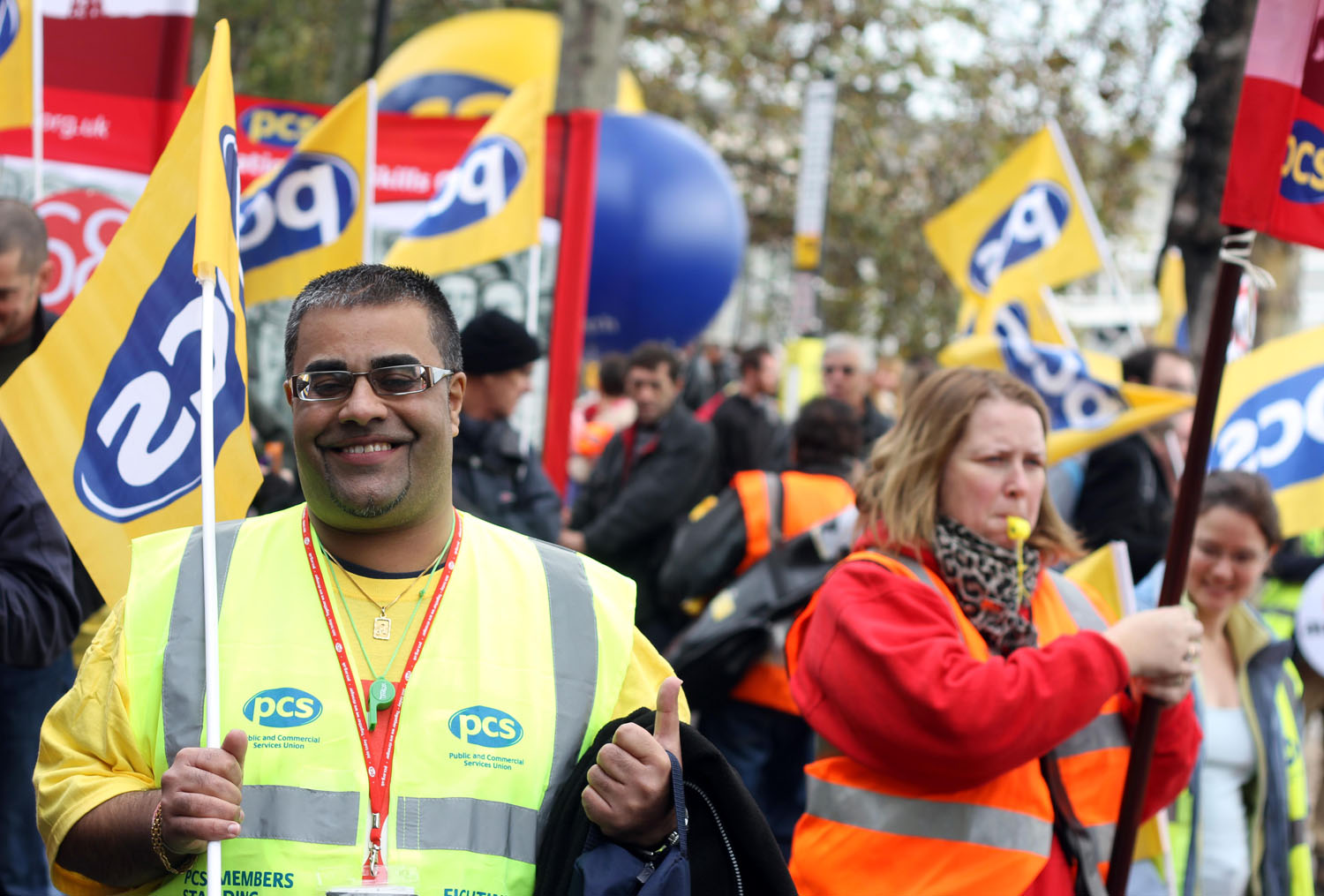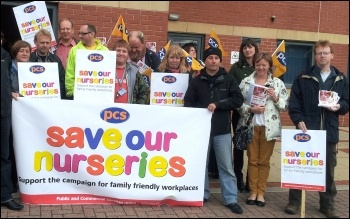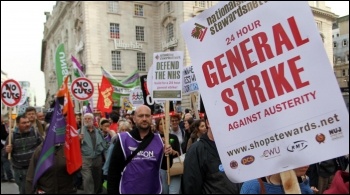PCS fighting the austerity agenda – ‘Action gets results’
John McInally, Vice President, Public and Commercial Services Union (PCS)
The coalition government’s austerity programme is being increasingly exposed as a disaster for all but the business and banking elite.
Tory strategists now assume theirs will be a one-term government. That is one reason for their scorched earth policy.
They know that if Labour is elected, its embrace of austerity policies will mean a ‘safe pair of hands’.
The civil service is again in the firing line. A leaked letter from the Cabinet Office says: “If the reforms are implemented, the Civil Service of the future will be smaller, flatter, more unified, more digital, more accountable for delivery, more capable, better managed, and ultimately – more fun to work for”.
This management-speak gibberish cannot conceal the real intention – to cherry-pick what services can be squeezed for profit and discard the rest.
Everything will be up for attack according to ministers, including annual and flexi leave, sick pay, mobility, probation, discipline and grievance procedures, as well as travel and expenses and trade union facilities.
Ministers, such as multi-millionaire Francis Maude, recognise that PCS’s unwavering policy of ‘No Cuts No Privatisation’ has been at the heart of organised resistance to their austerity policies.
PCS never accepted the ‘need’ for austerity and its campaign for an alternative based on tax justice, investment and job creation, derided as deficit denial, exposes the insanity of the market.
That is why the left-led PCS leadership is seen as public enemy No 1 by the government.
Attack on union organisation
The Tories are wrong if they think cutting trade union facilities to below the statutory minimum will mean activists and members will let them destroy jobs, living standards and services. These attacks will breed a new, more determined generation of trade union activists.
These attacks, including attacks on the health service and other areas of the public sector, are only possible because of the abject crisis of leadership in the labour and trade union movement.
Ex-TUC general secretary Brendan Barber has retired. He’s off to enjoy his huge pension and pay-off while the millions of members he once sold out have had their pension rights stolen.
After being pressured, not least by PCS, into ‘leading’ the magnificent two-million strong public sector strike on 30 November last year Barber, in virtual open collusion with Tory minister, Francis Maude, tried to strangle the fight-back by ‘selling’ the so-called Heads of Agreement. This was instead of organising further action.
At the TUC in September 2012, unions voted for joint coordinated action and also to discuss the “practicalities” of calling a general strike.
Yet Barber, perhaps with an eye to future ennoblement, on the morning of the debate told the media a general strike wouldn’t happen.
PCS has always argued, most recently by president Janice Godrich at the TUC general council before Christmas, the most effective way to defeat the government’s austerity policies is by joint coordinated action.
PCS will do everything in its power to build the widest possible coalition across public and private sector unions to oppose the austerity programme, including recently writing to all unions.
We are flexible about plans to coordinate industrial action. But we cannot wait while these attacks on terms and conditions go ahead.
PCS will not stand back and allow the government to steal members’ rights and continue yet another year of pay cuts.
Some members are now facing a fourth year of pay freezes and living standards have fallen by an average of £1,200.
If this is not challenged then the government will think it can make it the norm for the next decade or more. This issue is the best opportunity to build coordinated action across the public sector.
PCS would far rather negotiate but will ballot members in February if the government refuses our request for talks.
The ballot will cover jobs, pensions, privatisation and all the issues covered by the previous national ballot.
But it will also focus sharply on the assault on terms and conditions and pay. The ballot would be for discontinuous strike action and discontinuous action short of a strike. If the Tories think PCS are contemplating “protest” action they can think again.
They should understand now we will respond by organising the most effective programme of disruptive action the civil service has ever seen.
A vital part of PCS’s response will be ongoing and developing disputes in the departmental groups. These will be coordinated by the national union.
Major concessions, including increased staffing, have already been won by the union. PCS members in the Home Office, Driving Standards Agency and HMRC have all won concessions.
DWP members have also taken action and won significant gains in the contact centre dispute and the long-running Merseyside dispute.
DWP members have voted by 2:1 in opposition to compulsory redundancy notices being issued.
Members in other public sector unions whose members also face attacks, will wonder why their leaders are not organising action.
TUC unions have been asked to set out their views on the “practicalities” of a general strike, from the motion moved by the prison officer’s union POA and passed by TUC Congress. The responses of some ‘leaders’ are entirely predictable – they won’t be supporting a general strike anytime soon, how could they ever explain that to Ed Miliband and Ed Balls?
Every union in the TUC has a current or potential dispute with their employer on jobs, pay or other issues such as privatisation. All that is required is for the TUC to call these unions together and name the day.
Whatever the leadership of the TUC decides at its next meeting, the demand for a general strike will not go away.
Most serious trade union activists and members now know a 24-hour general strike is the most effective way to start to take on this government.
Trade union leaders who are serious about organising action in a “coalition of the willing” should discuss coordinating their ballots – as was done for the N30 pension strike last year.
Attacks are increasing. But the resistance against austerity is also. The cowardly role of right-wing trade union leaders will be sharply exposed.
PCS’s fighting, campaigning leadership, along with its battle-hardened activists and members, will face the government attacks by fighting back. Campaigning works and action gets results.
.
PCS press release 16 January 2013:
A quarter of a million civil and public servants will be balloted for strikes after the government refused to negotiate over cuts to pay, pensions and working conditions, the Public and Commercial Services union announces.
The union wrote to the Cabinet Office and civil service employers before Christmas asking for talks on the key issues affecting the lives of civil servants and the services they are able to provide to the public.
After hearing that the head of the civil service, Bob Kerslake, has refused to engage on any of these issues, the union’s national executive committee agreed today (16) to move to an industrial action ballot starting on 8 February and closing on 4 March.
If the government continues to refuse to negotiate the union will make plans for a series of strikes over a period of time, including full and half-days, and shorter walkouts. It is also writing to other unions to seek discussions about the possibility of coordinated or supportive action.
The announcement comes as ministers turn their fire on the civil service in what the union says is a clear attempt to try to deflect attention from the fact that austerity isn’t working and that political decisions are causing serious damage to our economy.
Because of massive job cuts civil and public servants are working harder than ever to provide the public services that we all rely on. But instead of rewarding them, the government is cutting their pay, raiding their pensions and trying to rip up their contracts by cutting terms and conditions.
A plan announced in the autumn to review all civil service working conditions could lead to longer working hours and fewer family-friendly policies.
The four-year pay freeze and cap, and increased pension contributions, would cut pay by 16% on average by 2014.
The union said more than two years ago that austerity wouldn’t work, and that we needed an alternative of investment in public spending and a rigorous clampdown on tax avoidance and evasion.
The flatlining of our economy since 2010, and the threat of a triple dip recession, shows the union was right then and is right now to continue to campaign for this alternative.
The union has called for a minimum pay rise of 5% or £1,200 for all civil servants this year, for the living wage to underpin all government contracts, for no cuts to terms and conditions, and no increase in pension contributions, no increase in the pension age and no reduction in pension benefits.
This new national ballot replaces the one the union held in June 2011 which led to strikes over pensions in that year and 2012.












